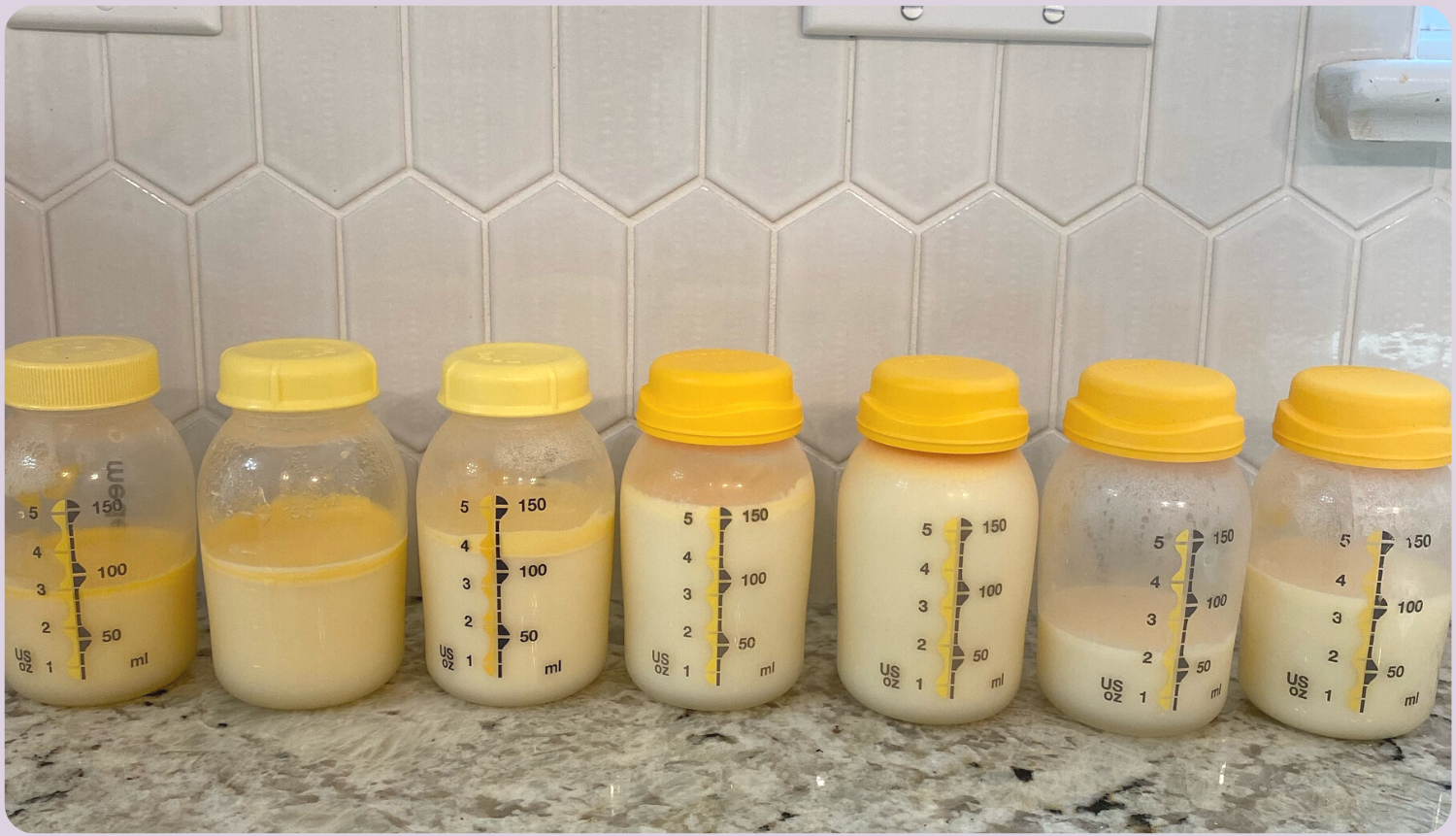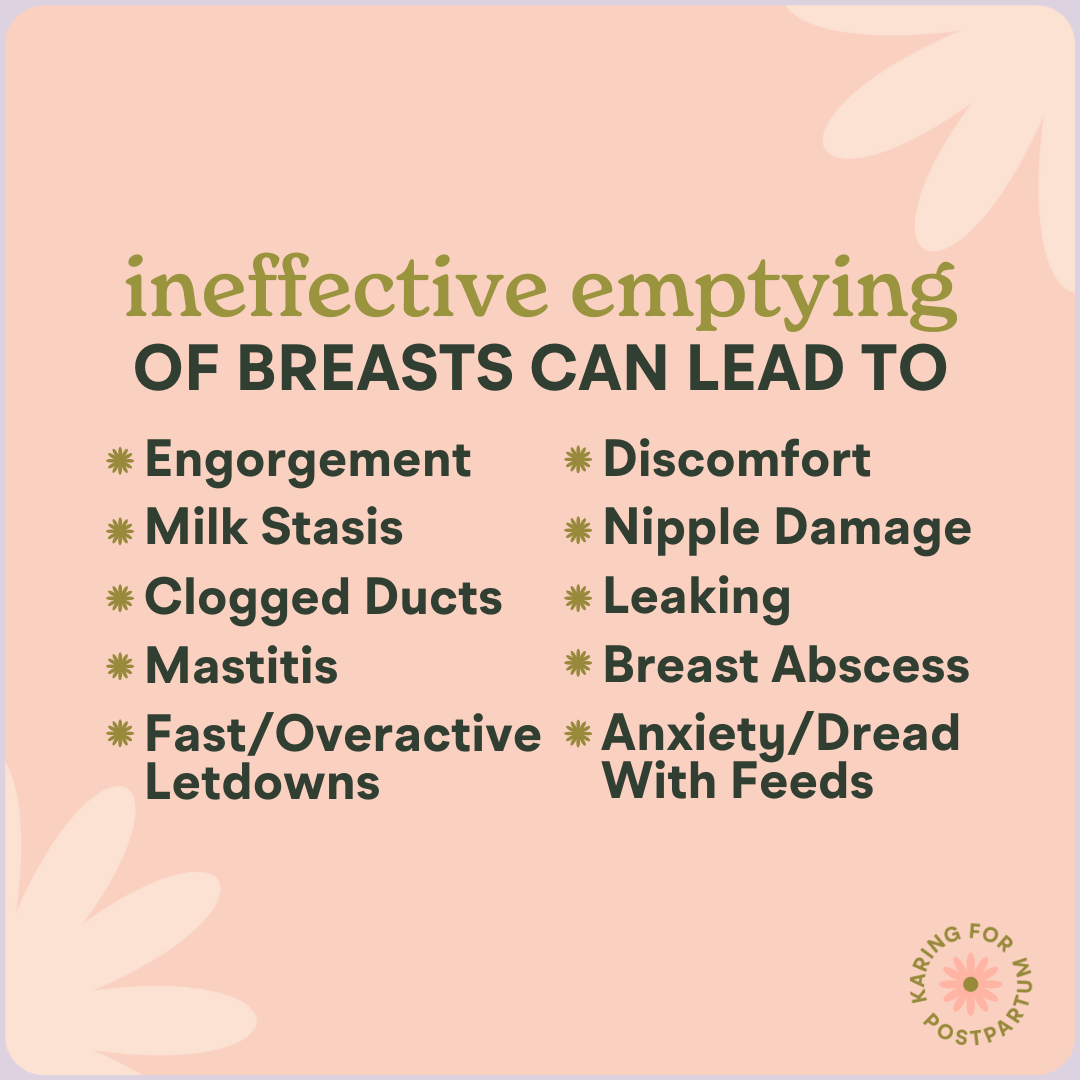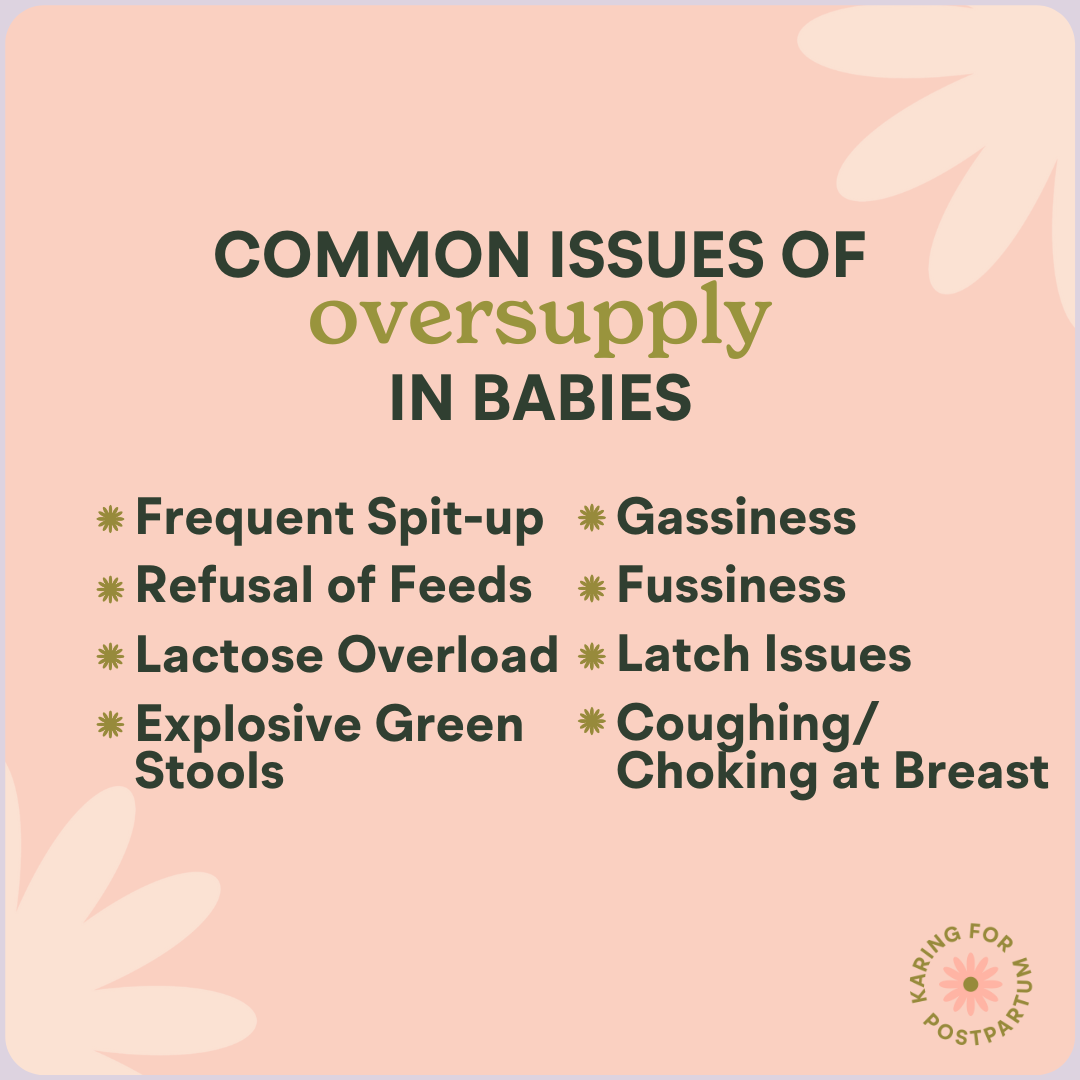MILK OVERSUPPLY: Why it Happens & What to Do
Oversupply often gets labeled as a “good problem” to have, when in reality, for many women with a large oversupply, that is not the case. The amount of milk made is not the only thing we look at when talking about milk oversupply, yet seems to be the only focus so often.
Many times, an extreme oversupply can bring forth more issues.
There is a spectrum of oversupply— from minimal and manageable to more severe. Let’s talk through what causes oversupply, its impact on mom and baby, and some things you can do to help!
Let’s get started!
MY oversupply EXPERIENCE
With my son Cam, he latched well on the right side but hated the left. We used a nipple shield to get him on, but it was still a struggle on the left.
Instead of being instructed on what to do, I figured I needed to pump since he didn’t really nurse on one side. HOWEVER, instead of just pumping on the side he didn’t like (which I probably didn’t even need to do each time), I pumped 15-20 minutes on BOTH sides after EVERY feeding session. This basically told my body that I had 2 babies.. not 1.
Day 3 postpartum, I had clogged ducts galore and was incredibly engorged. I had a c-section, so I was still in the hospital at this time! We literally wrapped my boobs with ice packs and an abdominal binder, and one of my coworkers had to massage my boobs because I couldn’t lift my arms. And guess what? Even through all of that… no one at the hospital told me to stop or adjust my pumping. So I kept doing it, not understanding the relationship of demand/supply— thus, worsening my oversupply. I just kept telling myself that “this must just be what it’s like when milk comes in”.
It is 100% not an experience I would wish on anyone! I cried so much. This is why I feel so strongly about this topic and want to share the info with you all!
WHAT CAUSES oversupply?
Some women produce large volumes of milk due to things like hormonal imbalances, i.e. prolactin and/or thyroid levels, etc.
Oversupply, though, can often stem from “mismanagement” or “overstimulating” yourself.
For example, many women believe or are told that they are supposed to nurse their baby and then immediately whip out the pump. If their supply is already meeting baby’s demand, this can cause too much stimulation, thus making the body produce way more milk than is needed.
IE: Someone who is having good and effective nursing sessions (baby is latched well, actively nursing, deep latch, hearing swallows) and then consistently pumping for 15-20 minutes right afterward is likely overstimulating themselves. This will then alert your body with the message, “We have not one, but TWO BABIES TO FEED.” Your baby is putting in orders for milk when they nurse, then we are putting in more orders for more milk when we bust out the pump on top of that.
(This is VERY different from someone who is intentionally trying to increase supply due to a sleepy feeder at breast, working through latch issues, supplementing, oral ties, triple feeds, etc.)
In those early weeks, our bodies are often already overcompensating because it doesn’t yet know baby’s demand. Adding in pumping unnecessarily may only add to your body’s confusion.
Exclusive pumpers can also have oversupply! Many times this comes from adding more frequent pump sessions to ensure we’re “keeping up” with baby’s bottle intake and/or also feeling the need to have a “just in case” freezer stash. It can also stem from pumping much longer than necessary to “fill the bottles to the top”
Oversupply can also occur when we pump to empty because we’re engorged - even if we just fed baby. This is like a cycle that can further exacerbate the problem. (Remember: if you’re engorged, only pump until you feel relief, not until empty!). It’s easy to think “wow, my breasts are so full, I better pump and empty them to relieve myself so I feel better”. This action may start a vicious cycle, as our body thinks “oh! all that extra milk really was needed (since it was used)! We better keep up production!”
HOW OVERSUPPLY AFFECTS women
So you’re making too much milk. Let’s talk about the physical aspect of that and the effects it has on mom’s body.
PHYSICALLY
If we are ineffectively emptying our breasts, regardless of how much extra you’re making, there are risks:
Engorgement
Milk Stasis
Clogged Ducts
Mastitis
Breast Abscess
Discomfort
Nipple Damage
Leaking
Fast/Overactive Letdowns
Anxiety/Dread with Feeds
The risk of these are tenfold in a woman struggling with oversupply, because many times they’re uncomfortable and engorged + milk is not being removed effectively because there’s too much of it!
MENTALLY
It can constantly feel like this: I just fed my baby, they’re full and don’t want to keep nursing, but I’m still uncomfortable. Should I pump? But that may worsen things? Do I just sit here and hope for the best? This hurts…
The cycle can seem endless...it’s NOT FUN, you guys. I get it, I’ve totally been there. I remember feeling stuck, like I couldn’t leave the house when I got home.
If I moved my arms, my boobs would leak.
I couldn’t feed my baby in public.
I was sore and uncomfortable.
What if baby didn’t latch?
I just want to cry.
The mental gymnastics it takes to navigate can take just as much of a toll on your body as the physical aspects. I felt so much dread and like it was my fault. I even had an unhelpful LC on the phone (while crying asking her what I could do to make this better) tell me it was essentially my fault.
So let me be the one to tell or remind you: IF YOU ARE STRUGGLING WITH OVERSUPPLY, IT IS NOT YOUR FAULT, MAMA.
You’re doing the best you can! We can figure this out!
HOW OVERSUPPLY AFFECTS baby
Yes, oversupply can actually impact baby, too!
Oversupply/engorgement can lead to issues like:
Latch issues - when you’re extremely full and constantly engorged, it can actually pull your nipple inward, making no “ledge” for baby. Essentially, it’s like trying to latch a baby onto a basketball…there isn’t anything there for them to grab with their mouth!
This can lead to not being able to latch at all, slide off, super shallow which can lead to damage, etc.
Lactose overload - Babies can have a hard time working through all of that lactose-filled watery foremilk before getting full, so they don’t get to the fattier, rich milk in the feedings.
Lactose is sugar, and taking in this much so frequently is often going to lead to issues in their digestive systems such as gas, fussiness, explosive bright green mucus stools.
Fast letdown - This happens when milk lets down forcefully because there is so much of it
This many times leads to baby pulling off, coughing, choking, sputtering, popping on/off, not quite able to grasp on or stay latched on the breast
This may lead to increased air intake, leading to a lot of tummy upset and gas. Just like when you chug a carbonated soda and all that air sits there when you can’t get a burp out - it can be painful!
These breastfeeding issues caused by oversupply can lead to these common problems in baby:
Frequent spit up
Refusal of feeds
Lactose overload
Explosive green stools
Gassiness
Fussiness
Latch issues
Coughing/choking at breast
It’s nobody’s fault! You’re doing everything you can.
WHAT CAN WE DO?
I want to go over my top recommendations on relieving your oversupply with some of those earlier breastfeeding issues in mind.
First, though, I highly recommend watching my full oversupply highlight. There is so much information on oversupply, the highlight covers more of my personal experience, and more information on these following recommendations that I think you’ll find super helpful that didn’t quite fit all into one blog.
Here are my recommendations:
If you’re engorged, try reverse pressure softening to help push fluid away from the nipple and help your baby latch more deeply. You can do this by pressing in to the chest wall with 2 fingers on each side of the nipple.
If you have an overactive/fast letdown, catch that letdown first with something like a Haakaa, hand or manual pump. This will get that fast and furious letdown out of the way which will help avoid some of those GI issues (air intake, gassiness, etc) we see in baby. It will also soften the breast a bit to help with latching.
Reclined or side-lying nursing position. Do not work with gravity! That would only make the letdowns more forceful. I found that lying back with Teddy almost lying on top of me really helped. You can try REclined nursing or INclined nursing! I have a reel on Instagram showing both of these.
4. Work closely with your lactation consultant.
5. If you know your oversupply is caused by pumping after good feedings, try first cutting down or weaning those. It may take time, and that’s okay!
6. Block Feeding is another option to help manage oversupply. This is typically the most result-driven and fastest way to help oversupply, but it’s best to work on this with your LC. This entails devoting a block of time “x hours” to one side for feeding and then the next “x” hours for feedings only on the other side.
Here are some of my favorite products:
Hot/cold packs — heat is okay before/during feeding to help with milk flow. Ice is best between feeds to decrease inflammation! Also love the ice roller for this!
Elvie Catch— Wonderful for leaking between feeds and collecting milk without suction (which can lead to signals for more milk)
Elvie Curve— This is nice for taking the edge off enough for engorgement to subside a bit before latching baby
Manual Pump— This is another option for taking off some milk to soften the breast before latching baby to avoid too fast letdown
Reusable Breast Pads— I love these for leaking mamas. Just make sure to change them when wet and wash/reuse!
Oversized Tee —always have an extra tee when you leave the house.
I know that was a lot of information, but hopefully it helps paint oversupply a little more clearly!
If you are currently in the trenches of oversupply and are feeling helpless and hopeless and want to cry, I want to say that it isn’t your fault, and you’re doing absolutely amazing, Mama. You’re doing all that you can for your baby. For those with severe oversupply, it can feel exhausting and like it’s never going to end. I promise it will get better! If you’re still uncertain where to begin, I would highly recommend reaching out to a local lactation consultant who can guide you more more personally.
You’ve got this, Mamas!
Xoxo
Karrie
Was this helpful? Save it for later!











